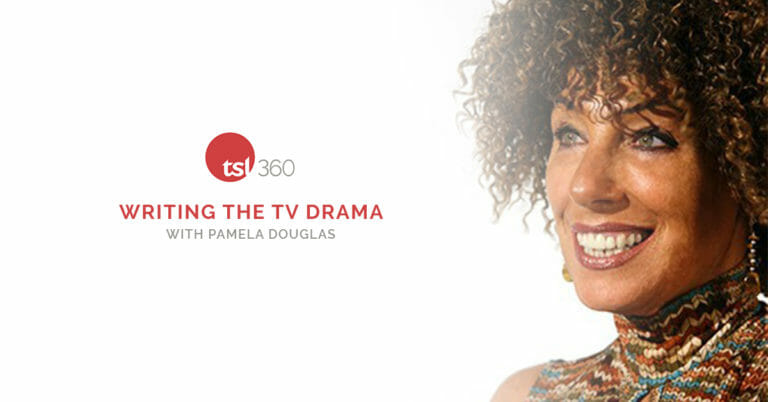By Rebecca Norris · February 18, 2019

In our constantly evolving, global media marketplace, it’s easy to feel confused about what kinds of stories you should be writing. As writers and as consumers, we’re overwhelmed with entertainment options on TV, from network to cable to streaming, not to mention YouTube, gaming, and virtual reality.
In her new video on TSL 360, award-winning television writer and USC writing professor Pamela Douglas dives deep into the current global landscape when it comes to television, and sheds light on the unprecedented amount of opportunities available to writers today.
Pamela is an award-winning writer with numerous credits in television drama. She has been honored with the Humanitas Prize, as well as multiple Emmy nominations, Writers Guild Award nominations, and awards from American Women in Radio and Television. She is a professor in the screenwriting division at the University of Southern California, and recently authored the fourth edition of her book, Writing the TV Drama, for which she traveled the globe to further understand the international reach of television.
If you don’t already have a TSL 360 membership, be sure to join TSL 360 for a FREE 3-day trial membership! TSL 360 is the LARGEST screenwriting education content library where you can learn from the best in the biz, featuring dozens of masterclasses, deep-dive interviews and lectures from Academy Award-winning screenwriters, Emmy-winning TV writers, producers, agents, major studio executives – all in one place.
“At this moment in television, there are more than 700 shows in production right here in Los Angeles. That encompasses all kinds, and it encompasses all venues. The idea of television has grown and changed exponentially in just the past few years, and that makes this the most explosive moment in media history,” says Pamela. “And it’s not because of anything that happens in movies; it’s not because of content even. It’s because it’s the system itself is evolving.
There was a time long ago in the 20th century…where television was just a box in the living room, and people sat there on a couch and looked at things that were scheduled at a certain time. And the programming that was done for those people were what was called “LOP,” least offensive programming. Meaning they were looking for mass audiences, and in having mass audiences, they had to please everybody. Which meant that in the aggregate, they pleased no one. It was all watered down. That’s ancient history. That’s what some people who don’t know think that television is. That’s not what television is.
Right now, television is the most cutting edge in all of media, because the definition of television includes, according to the Writers Guild, anything that is not a theatrical feature in a movie theatre. Now that includes everything…everything you see on Netflix… Amazon… on your computer… or on a game box. Or on devices that are yet to be invented. As a matter of fact, if you look at a writer’s contract for much of what you would sign for when doing an original script, you’ll find that the contract gives them rights to everything universally, throughout the universe for eternity… so we’re looking at an expanding, explosive opportunity realm right now.” (:15 – 2:54)
“There is more and more awareness of shows that are coming from other countries… We’re looking at a transitional time where opportunities are exploding… they’re exploding here because of the number of shows being done, because of the kinds of writing that can be done, because of the number of people needing to feed this growing machine, because of the global reach, and because the floodgates have opened in terms of kinds of material that you can do. So it is a great time to write for television because of all of the opportunities.” (17:15-18:33)
“There are some universals that are just human. And those kinds of things work. If you’re looking for something that is specific, like Portlandia…that’s so internal, that’s so insular, that if you’re dealing with a certain kind of upper-class insularity, those things are very funny… ’No, no, no, put the dressing over here,’ and ‘Where did you grow your lettuce?’ and that’s not going to mean anything to somebody in some places. But relationships—everybody gets it. Everybody gets the awkwardness of falling in love, falling out of love.
There are some countries though, where there are certain kinds of subjects that are very real to the people, I’ll give you an example… there’s a whole social setup [in India] where women who are newly married move into the homes of their husband and the key relationship in their life turns out to be their mother-in-law. So all the funny stuff, and the serious stuff, and the drama is young bride and mother-in-law. We don’t have those stories here, it wouldn’t mean much to us. But it’s either hilarious or tragic to them there… but most things, as you go around the world, are fairly universal. If you’re a comedy writer… I think, although comedy excels in the particular, you wanna make sure that you’re writing things that are universal and then it will work wherever.” (18:50-20:54)
“I would tell anybody to write what they need to write without worrying where it’s going. I think if you are interested, if you really are intensely talented in an area, and you have a good perception of the relationships there, and the things people would say and do, go for it. Don’t censor yourself. Not everything has to relate to everybody everywhere. And that’s one of the great things about streaming. All of these streaming platforms don’t need the mass audience that the old LOP shows had on the networks. ‘Cause think of the difference: the networks had to have a lot of eyeballs on whatever they were selling. It’s a different business model for streaming. They just want you to subscribe to their service. So you only have to like one thing… Write what you want… if you can get Netflix, or Hulu, or HBO, or some of the others… interested in your show, or if you can take your talent and apply it to some existing show, do it, do it. Don’t worry about the marketing part.” (20:55 – 23:45)
Watch Pamela’s video on TSL 360 to learn more about what makes a great pilot that can play internationally, what writers should have in their portfolios when trying to break in, and what one streaming show so intrigued her that she decided to subscribe to Hulu.
Securing Distribution for Your Film with Alexandra Boylan
The 11 Fundamental Questions with Aaron Mendelsohn
7 Strategies for ‘Producing People’ and Being a Great Producer with Kristen Murtha
8 Keys to Unlocking Hollywood Gatekeepers from Producer Sandra Leviton
5 Ways to Break In as a TV Writer

 Rebecca Norris is a producer, writer, and filmmaker with her production company, Freebird Entertainment. Her recent award-winning feature film, Cloudy With a Chance of Sunshine, has been distributed on Amazon Streaming and DVD. Rebecca is also a script analyst and consultant who has read for many companies, including Sundance, ScreenCraft, Bluecat, and the International Emmys, as well as her own script consultancy, Script Authority. Rebecca blogs for Screencraft, The Script Lab, WeScreenplay and Script Magazine, exploring the film writing and production process and encouraging writers to produce their own work. Follow Rebecca’s posts on Twitter at @beckaroohoo!
Rebecca Norris is a producer, writer, and filmmaker with her production company, Freebird Entertainment. Her recent award-winning feature film, Cloudy With a Chance of Sunshine, has been distributed on Amazon Streaming and DVD. Rebecca is also a script analyst and consultant who has read for many companies, including Sundance, ScreenCraft, Bluecat, and the International Emmys, as well as her own script consultancy, Script Authority. Rebecca blogs for Screencraft, The Script Lab, WeScreenplay and Script Magazine, exploring the film writing and production process and encouraging writers to produce their own work. Follow Rebecca’s posts on Twitter at @beckaroohoo!
For all the latest from The Script Lab, be sure to follow us on Twitter, Facebook, and Instagram.